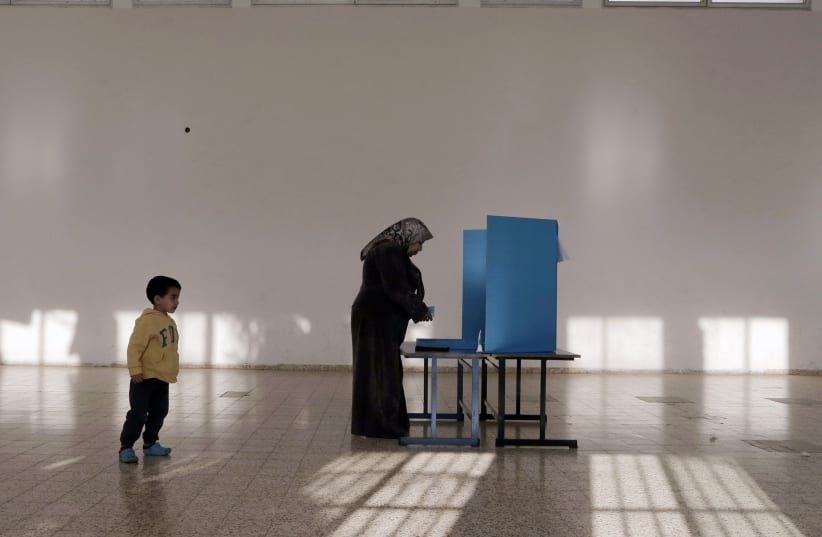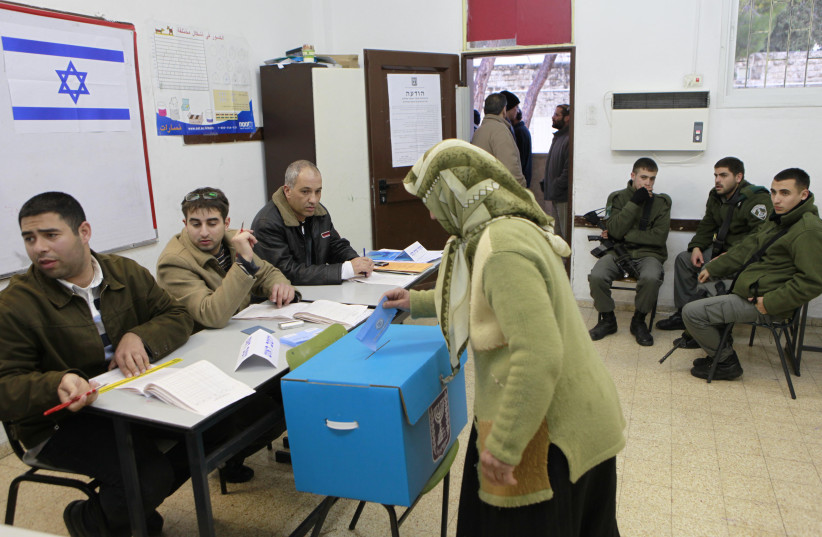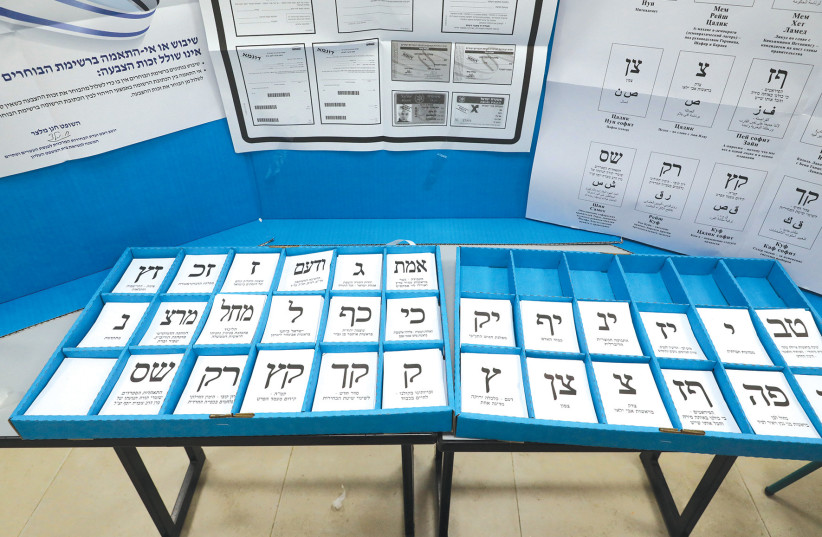Some 69.9% of Israel’s Arab citizens are either certain or think they are going to vote in the election on November 1, according to a poll conducted by the Israel Democracy Institute that was conducted in late September and published on Thursday.
However, history has shown that the number of people from the Arab sector who say they intend to vote is far higher than the actual number that ends up voting, and the expected real percentage is currently approximately 44% but trending upwards, according to IDI researcher Dr. Muhammed Khalaily, one of the polls’ authors.
This roughly equals the voting percentages amongst the Arab population in the previous election in March 2021, which stood at 44.6%, but Khalaily said he expects the actual voting percentage on November 1 to rise to approximately 50%, for a number of reasons.
“First there is the competition between the parties.... When you are in danger of not passing the electoral threshold, you fight to get out people who otherwise would not have voted,” Khalaily said. All three Arab parties that are running in this election, Hadash-Ta’al, Ra’am, and Balad, are fighting to pass the electoral threshold, with the first two slightly above it and the third far below it.
Fighting for Arab voices
The parties are not just fighting to make it into the Knesset, but also for their financial survival, Khalaily explained. No Arab party that failed to pass the threshold ended up surviving, because by entering the Knesset parties receive vital funding that helps them continue to finance their institutions and activity. Without the funding, the parties may collapse.
“Second, people are also beginning to understand that in the end they want someone to be in the Knesset, they do not want the Knesset to be Jewish only. They are angry and frustrated, but still want someone to fight for them,” he said.
“The third thing is that people are beginning to understand the meaning of a fully right-wing government, with [far-right Otzma Yehudit party leader MK Itamar] Ben-Gvir as a minister… Ben-Gvir as public security minister could bring about a disaster for the Arab public in his approach to fighting crime, on top of his racist views towards the entire Arab public,” Khalaily said.
Ben-Gvir threatens to send the Arab MKs to Syria on a weekly basis, and “one can only imagine what he will do to the average Arab citizen,” he said. The image of Ben-Gvir brandishing his pistol in east Jerusalem two weeks ago helped this message sink in. Ben-Gvir’s attempts to appear restrained during the election campaign is showing cracks and this is a major catalyst for Arab voters, Khalaily said.
A fourth is the parties’ organizational capabilities on Election Day itself. What polls show are the parties’ potential power, but their Election Day operations will determine how much of that potential is actualized, Khalaily explained.
Ra’am has the most well-oiled organizational capabilities to get their voters out on Election Day, and Hadash also has good organization. Balad, however, does not, and this could cost it tens of thousands of votes, he said.
The influence of Election-Day organization on the vote is especially important in the Arab sector, Khalaily added.
“ARAB SOCIETY is changing, but it still has a collective element of familial connections, and is not an individualistic society in the Western sense. People do not show up on their own accord to vote. They need to be coaxed, transported, and there are a lot of other factors,” Khalaily said.
What will the outcome be if all three Arab parties pass the electoral threshold?
If all three Arab parties pass the electoral threshold, the chances that Likud leader Benjamin Netanyahu will be able to form a right-wing coalition after the election will be drastically lower.
But a 50% turnout is simply not enough for all three parties to pass the threshold, Khalaily explained. There are approximately one million eligible voters, so 50% would be 500,000 votes. Out of these, 80% in the last election voted for Arab parties and polls are showing a similar number this time, leaving 400,000 votes for the Arab parties, not including a small number of Jewish voters who cast their votes for them as well.
Still, the electoral threshold is expected to be approximately 150,000 votes, which means that there were simply not enough votes to go around.
For all three parties to pass, the voting percentage of Israel’s Arab citizens would need to rise to approximately 55%, Khalaily estimated.
The poll also found that what Israel’s Arab voters most about was lowering crime and improving their socioeconomic situation, and not matters related to identity or to the Israeli-Palestinian conflict.
Asked which issues should be at the heart of the election campaign, 53.8% answered “solving the problem of violence in Arab society.” Second place, at 16.1%, was “land and housing throughout Israel,” and only 4.6% thought that the Palestinian issue should be central to the campaigns.
Three main causes emerged in response to the question: What do the respondents think is the main reason for the high level of crime in Arab society in Israel? 28.3% said “poor functioning of the police and law enforcement agencies”; 28.2% said “the economic situation of the Arab public, and the large financial rewards of being involved in crime”; and 19.6% gave the main reason as “the state does not invest sufficient resources into crime prevention.”
A majority of respondents were disappointed by the fact that Ra’am’s membership in the coalition over the past 16 months did not do enough to change the situation. While 43.2% said they strongly or somewhat agreed that it helped improve the situation of Arab citizens in Israel, 55.3% somewhat or strongly disagreed.
Still, a large majority (69.5%) supported Arab parties joining the next coalition, and an even larger majority (74.8%) supported the appointment of Arab ministers, the poll found.
Khalaily put out a clarification later on Thursday. “In our survey, 70% of the respondents said that they are sure, or are considering that they will vote. In order to understand how this will actually impact voter turnout on Election Day, more research and data must be taken into consideration including personal interviews, anticipated behavior and a number of other factors.”
“Once this is done, current estimates indicate that we will see a far lower rate of actual turnout – optimistic readings would find the number closer to 50%. At the end of the day, the outcome will be determined by the Arab parties’ ability to organize on the day of elections and to galvanize their public to go to vote.”


